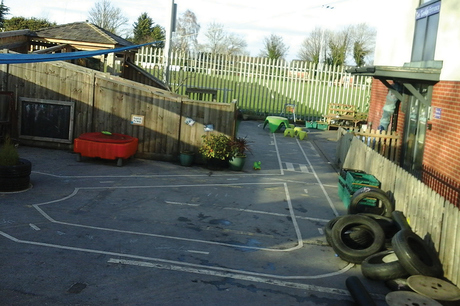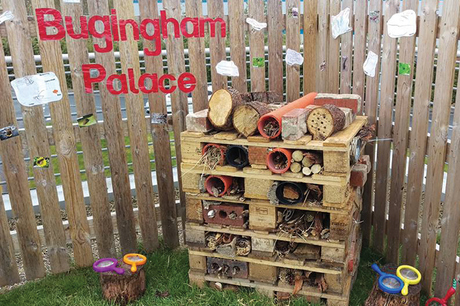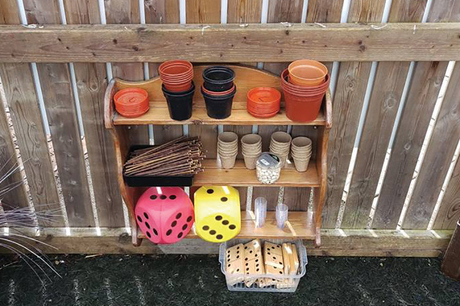
Last winter, the outdoor areas at Twinkles Day Nurseries in Yorkshire were looking unloved. ‘As a lot of the equipment is out being played with, whatever the weather, it had started to look a little tired. We also felt that while we offered a wide range of learning experiences inside, we were perhaps not supporting learning as well as we could outside. The gardens were also not as accessible as they could be for babies and we wanted to provide a more suitable space for them,’ says quality, EYFS and marketing manager Kirstie Stericker.

The areas were in need of a makeover
She set a challenge of transforming them with a budget of just £200 per setting. She says, ‘The rules were quite simple: ensure that development in all areas of the EYFS is promoted, ensure the garden is accessible for children of all ages and has learning opportunities for all weather.’
How was this possible on such a budget? The challenge was to make and upcycle rather than buying new toys. In the event, no settings went over, and some settings came in under, budget. To encourage the settings to get behind the project, each finished garden was judged and a prize of £250 was awarded to the winner, with runner-up prizes of £50 for everyone else.
‘In the end, the nurseries were very competitive and creative with everything they did, involving the children, parents and local businesses,’ says Ms Stericker.
THE PROCESS
Each setting got together to brainstorm ideas, with everyone encouraged to put forward suggestions and bring in pictures of things they wanted to create. Pinterest was the main source of inspiration. Ideas were turned into projects and staff apportioned to each. Children were consulted on what they would like in their gardens.
Donations of both materials and labour were then sought. Parents provided tyres, bricks and stones for bug houses and pans for mud kitchens and music walls. One father built a climbing wall, and another created a raised stage, with the decking donated by another parent. A local plumber donated guttering for a water wall and fitted it. A builder’s merchant helped with cutting wood, and another local business donated giant cable reels.
Money was then spent on paint for the tyres, which were given various uses including a giant hungry caterpillar, a bumble bee seesaw and a den. Other purchases included baskets to attach to pallets, fabric for draping, fairy lights, chalk paint, climbing stones and plants.
THE TRANSFORMATION
The outdoor areas were previously resourced with more traditional outdoor toys, such as bats, balls, bikes, sand and water trays and plastic construction sets.
Four months later, as well as updates for existing areas such as mud kitchens, and a construction site transformed with a three little pigs theme and old road signs salvaged from skips, brand new zones such as a campsite, a mini sensory garden and a water play area with water wall had sprung up. Features at one setting now include a large bug hotel –Bugingham Palace – along with a car wash and welly wall.

‘Roads’ were made to link different areas from old house bricks that were painted with black and white paint, or old bed slats.
Babies were a key focus of the project. An existing canopy area was made into an area for babies, with soft flooring, a sensory wall and ceiling swathed in fabric and hung fairy lights. In another setting, a patio area had tyres filled with soil, sand and grass for small world play, a music wall, a water wall, a cosy area and lots of colourful flowers.
Recent tracking had also identified maths as an area of focus for all five sites, so as well as booking external training, staff wanted to ensure there was lots of opportunity for development of mathematic skills outside. Old coat hangers and buckets were upcycled into scales. Children can now weigh with loose parts, and explore number using homemade dominoes, number lines, numbered plant pots, a homemade tic-tac-toe game, and giant rulers for measuring.

Maths resources
Staff also took the opportunity to make the gardens more practical. Pre-school staff transformed one shed into a hut for reading, moving it into a sunny area of the garden to provide some much-needed shade. Upcycled pallets were hung on the fences for storage.
Children were involved in the process: at one setting, each child painted a tile which was then used to create a feature wall. At another they helped to plant vegetables and strawberries with the nursery gardener.
The project has transformed life for staff and children alike, says Ms Stericker. ‘We had tried to keep it a secret from the children, and staff did a lot of the making at weekends. The children were very excited when it was first done, and there was a lot of running around.
‘It’s so much easier for the children – there is much more for them to do outside – and it’s much easier for staff to support their learning and development. A lot of parents have commented on how nice it is now,’ she says.









